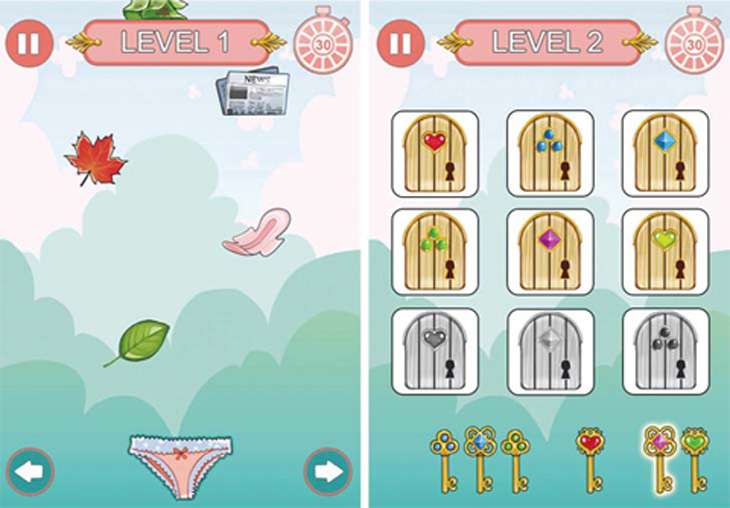
'Chums'. That's the term girls I studied with used to refer to their periods. They did it because the idea of menstruation was embarrassing. Distasteful even. They'd awkwardly excuse themselves from class, whispering into a teacher's ear before disappearing, bag in tow, to the bathroom for a few minutes. When they returned they wouldn't make eye contact with anyone, suddenly so engrossed in the lesson that they'd seemingly forgotten the world around them.
They hid the reality of this absolutely normal process from the world like it was shameful. They did so because society has stigmatised menstruation to the point where it's almost a bad word.
Also read - New blood challenges orthodox concepts, forces us to rethink
Now, one Pakistani entrepreneur is trying to end this stigma. And she's doing it with a mobile gaming app.
The M-word
As a young boy, I had no idea what menstruation was. The closest I came to the topic was when ads for sanitary pads played on TV. And that was no education at all. I was left with bizarre questions like 'Why did women need diapers?' and 'What is this blue liquid they need these diapers for?'
It wasn't until sex-ed classes years later that I finally found out what menstruation was. And even those classes were heavily neutered..
Still, in all that time, I assumed that girls and women knew what the hell menstruation was. Heck, it happened to them once a month, they had better know, right? As it turns out, some did. But a whole lot of them didn't. And still don't.
Also read - Nepalese girls fight menstruation taboos with photography
In this vacuum of information, unfounded societal stigmas creep in, leaving women with the belief that periods make them 'unclean' or 'unhealthy'. Which in turn lead to superstitions like women should not cook or visit temples when they're menstruating.
The situation is bad enough that tampon packaging in the subcontinent comes with the disclaimer that using tampons don't take your virginity.
For Maryam Adil, a Pakistani World Bank employee based in DC, this sort of ignorance was something she'd faced growing up in Pakistan.
Also read -World Menstrual Hygiene Day: why we must talk about menstruation in India
She'd experienced how girls in her home country skipped school for a week each month out of shame. How some eventually dropped out altogether as a result. How poor menstrual hygiene or the lack of access to sanitary pads led to the use of rags and paper to stem period flow, eventually leading to sickness and infection.
Unlike a lot of women who just dealt with it and moved on, thankful to have survived it all, Adil decided to do something about it. The end product was MoHim, a game for mobiles aimed at starting a dialogue about menstruation and breaking the myths that surrounded it.
MoHim

MoHim stands for 'Menstrual Health Management'. The name translates to 'effort' in Urdu. The game is free to download and the premise is simple - use a pair of panties to catching falling sanitary pads while avoiding items not suited to dealing with periods like paper and and leaves.
Apart from just reinforcing good menstrual hygiene, points also earn keys. These keys can then be used to unlock myth-buster doors that contain information about the fallacies and superstitions surrounding menstruation

Adil hopes that this approach, rather than the stale approach of handing out pamphlets or giving talks, will be a game changer. Speaking to AFP, Maryam explained her approach to the issue, "Video games can target these social constructs and prompt individuals to challenge them in a fun way."
Also read - Menstrual man Muruga: women need to break taboo and talk about hygiene
The added advantage of this is that anyone with a smartphone and access to the internet can download the game without anyone knowing. In a country where menstrual pads are so taboo they are wrapped in paper bags before being put into plastic covers when sold, this discretion is very important. Women can learn about their periods without the additional embarrassment of appearing ignorant around peers.
It's not just for Pakistani women either. Ignorance about menstruation is a global phenomenon and Adil recognises that. She's already teamed with an NGO to distribute an iOS version of the game among women and girls in Nairobi's slums. In time, she intends to release an android version of the game too. After all, the more women who have access to the app, the better.
First published: 2 September 2016, 12:13 IST







![BJP's Kapil Mishra recreates Shankar Mahadevan’s ‘Breathless’ song to highlight Delhi pollution [WATCH] BJP's Kapil Mishra recreates Shankar Mahadevan’s ‘Breathless’ song to highlight Delhi pollution [WATCH]](https://images.catchnews.com/upload/2022/11/03/kapil-mishra_240884_300x172.png)

![Anupam Kher shares pictures of his toned body on 67th birthday [MUST SEE] Anupam Kher shares pictures of his toned body on 67th birthday [MUST SEE]](https://images.catchnews.com/upload/2022/03/07/Anupam_kher_231145_300x172.jpg)






